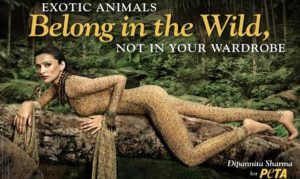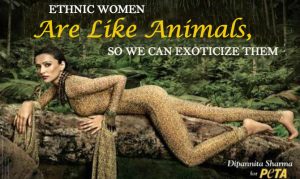
(Image Source: http://urbanasian.com/lifestyle/2014/07/dippanita-sharma-says-she-doesnt-use-exotic-skin/)
This ad by PETA, while well intended, sends the wrong message about ethnic women. Dipannita Sharma is a model/actress born in Assam, India. In this particular ad, Peta has replaced an exotic animal laying in the trees, like a cheetah, with Dipannita laying in a similar animal-like position. Peta is an organization that fights for the ethical treatment of animals, and are notorious for their controversial ads (especially the ones showcasing a naked celebrity, who claims he/she would “rather go naked than wear fur”). Like most of their ads, Peta’s purpose is to send the message that wearing fur is morally wrong, but what ends up coming across in this particular ad, is a very strong comparison of ethnic women to exotic animals. It was through Peta’s choice of wording in this ad that helps create this feeling of “other”. As Vikenberg explains, “Language can serve as a powerful tool to distance oneself from an outgroup”(382). It was through the choice of language, particularly using the word “exotic” and by using a non-white model, that this comparison becomes stronger and thus much more insulting. This exoticizing of the indian actress creates a feeling of “otherness”. This is a dangerous message to send as it signifies that women of other ethnicities are no more smarter or advanced than an animal, and thus are “lower” than the caucasian race in society. I can only imagine that their target demographic is upper class women. Which makes this “othering” idea all the more troubling. Fur with its hefty price tag, and high status within the fashion world, would only be attainable by someone who has the money to spend on such a lavish item. Furthermore, this ad then sends the message to the white elite, that ethnic women ARE just like animals, and can be treated as such. After all, according to this ad, women of other ethnicities are no more important or needed in society than the animals that make the fur jackets for the elite and belong in the “wild” – not society. It validates the mistreatment these women have faced by the rich and powerful within our society.

In this “jammed” version of the original ad, I changed the qoute from saying “Exotic animals belong in the wild, not in your wardrobe” to “Ethnic women are like animals, so we can exoticize them”. I did this to highlight the strong comparison of Dipannita Sharma to the exotic animal Peta is referencing. At first I was contemplating using a cheetah in place of the model, but I didn’t think that would showcase the issue quite as much. Leaving the model in the ad and blantanly pointing out what Peta is doing – “othering” the model, I hope would grab peoples attention just as the original message had done. Peta’s message itself, “Exotic animals belong in the wild, not in your wardrobe” is a completely fine message, and even a message I believe in myself. But this ad uses an ethnic woman in a highly sexualized animalistic way to deliver said message. Peta has succesfully created other ads that are more effective with actual animals (or at least photoshopped animals) exemplified here:http://www.peta.org/wp-content/uploads/2013/10/200_2D00_PersiaWhitePSA.jpg
and here: http://www.peta.org.uk/wp-content/uploads/2015/04/Ashley-James-Ad_FINAL300.jpg
These examples show that Peta is capable of creating ads that are shocking and grab the consumers attention without hurting anyone else in their path. This ad with Dipannita Sharma is attempting to send the exact same message that these other ads are sending, yet, these other ads do so without objectifying and belittling an actress of Indian decent. In my opinion, the other ads not only more successfully grab my attention, but their message is also stronger – that buying and wearing fur is morally wrong. I hope that my new quote on the jammed ad will highlight how wrong it is to exoticize women, especially ethnic women, and how the original ad was not necessarily successful in sending the desired message regarding the use of fur. If Peta had used a skinned cheetah, this ad would’ve made a huge impact while focusing on the intended message. As my jammed quote points out, using Dipannita Sharma in this way actually has very little to do with the use of animal fur and more to do with “othering” a women of Indian decent.
Sources:
Peta – http://www.peta.org/about-peta/
Wikipedia – https://en.wikipedia.org/wiki/Dipannita_Sharma
Vinkenburg, Claartje J. “Titles Matter: Addressing The Normalization Of Othering.” Academy Of Management Review 39.3 (2014): 382-384.Business Source Complete. Web. 24 June 2016.